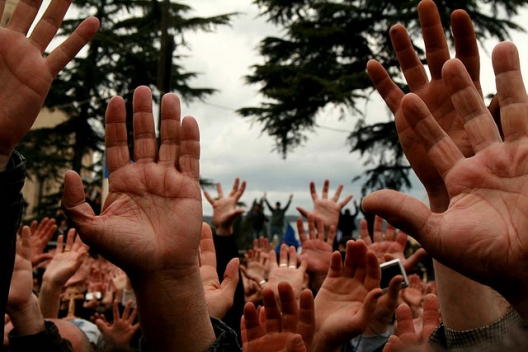 The situation in Turkey today could be much less polarized, without such strong anger and distrust of the police, if a key lesson learned in the South Caucasus had been applied in Taksim Square: governments should engage non-violent protestors and allow demonstrations to fizzle out gradually.The indiscriminate and violent police reaction in Turkey did the exact opposite. Already on May 31, it was evident that the police had chosen the wrong approach. Exiting a metro station onto Taksim Square, my eyes already tearing and my throat scratchy, I was suddenly between a wall of police firing tear gas and a group of people running towards Gezi Park, where days earlier a few dozen demonstrators began a protest against the uprooting of one of central Istanbul’s last green spaces.
The situation in Turkey today could be much less polarized, without such strong anger and distrust of the police, if a key lesson learned in the South Caucasus had been applied in Taksim Square: governments should engage non-violent protestors and allow demonstrations to fizzle out gradually.The indiscriminate and violent police reaction in Turkey did the exact opposite. Already on May 31, it was evident that the police had chosen the wrong approach. Exiting a metro station onto Taksim Square, my eyes already tearing and my throat scratchy, I was suddenly between a wall of police firing tear gas and a group of people running towards Gezi Park, where days earlier a few dozen demonstrators began a protest against the uprooting of one of central Istanbul’s last green spaces.
A massive number of police officers shot indiscriminately into gatherings of people on Taksim, on the city’s main boulevard Istiklal and on its side streets. As the operation extended into the rush hour, the traffic built up, schoolchildren put scarves over their mouths, and the thousands who daily use Taksim as their point of transit, many of whom had barely paid any attention to the tree-huggers in Gezi Park, started to get mad.
That anger with the police is what propelled 50 percent of those who would demonstrate in Istanbul over the coming weeks into the streets, according to a poll of 4,000 protestors conducted by the KONDA research group, a local polling firm.
It did not have to come to this. In the spring of 2009 in Georgia, the opposition organized rallies on Tbilisi’s main boulevard, demanding President Mikheil Saakashvili’s resignation. On the first day, up to 60,000 of the country’s approximate 5 million citizens took part. The protests lasted for three months, paralyzing the capital as people set up tents and blocked traffic.
Two years earlier at a similar November demonstration, President Saakashvili called in police who used heavy-handed tactics, including tear gas and water cannons. He was strongly condemned by his international partners and members of the Georgian elite for the violence. But in 2009, he learned from his mistake and let the demonstrations continue. The protests gradually got on most Tbilisi residents’ nerves as traffic was stalled and a pleasant promenade was shut down. Exhausted after 107 days in the street, organizers called the action off. Almost all of Tbilisi breathed a sigh of relief and the president capitalized internationally on his restored democratic credentials.
(But the lesson proved short-lived. Again in 2011, force was used and the president’s reputation suffered).
In Istanbul, by the second week of the Gezi Park protests, I could already sense a similar lassitude starting to grow amongst Istanbul’s well-heeled, who were tolerant, but not necessarily thrilled to see graffiti on landmarks, red flags bearing hammer and sickles on a former cultural center and watermelon sellers on Taksim Square. If only the government and the police had waited a few weeks and started a dialogue with the protestors, they might have reached an agreement to reduce the protests to a core group of environmentalists waiting for a court decision and possible plebiscite on Gezi Park.
We will never know. After repeated warnings by the government, Taksim Square and the park were violently cleared during the evening of June 15. Human Rights Watch described the police assault as a “dangerous disregard for the well-being – and indeed the lives – of protesters and bystanders.” Doctors, lawyers and journalists were targeted by police. A fourteen-year-old was hit in the head with a tear-gas canister and remains in critical condition. In total, over the past three weeks, five people, including a police officer, have been killed.
Officials are now calling for greater regulation of social media, which they are blaming for much of the past weeks’ mobilization. Here it could be extremely negative if Turkey looks to the South Caucasus for examples. In Azerbaijan in May the criminal code was amended to extend existing draconian penalties to online content, targeting Azerbaijan’s vibrant social networks and making it possible for bloggers to receive up to three-year prison sentences for defamation. Since 2009, several bloggers and Internet activists have been harassed, intimidated and detained.
Turkey is a regional leader, economic powerhouse, with a solid democratic history and where the rule of law is sacrosanct. Until recently, the police were trusted to guarantee public safety. The challenge for the police will be to regain the respect eroded over the past weeks. Law enforcement should review its crowd-control policies and police chiefs whose units attacked peaceful protesters should be held to account. Greater emphasis should be put on community policing. There are reports that Turkish police on Taksim Square are now reading books on how to improve communication skills. They may also read up on some of the good and bad lessons of their Caucasus neighbors.
Sabine Freizer is a nonresident senior fellow with the Dinu Patriciu Eurasia Center and the Program on Transatlantic Relations.
Image: Photo: gipajournos/Flickr/CC License
